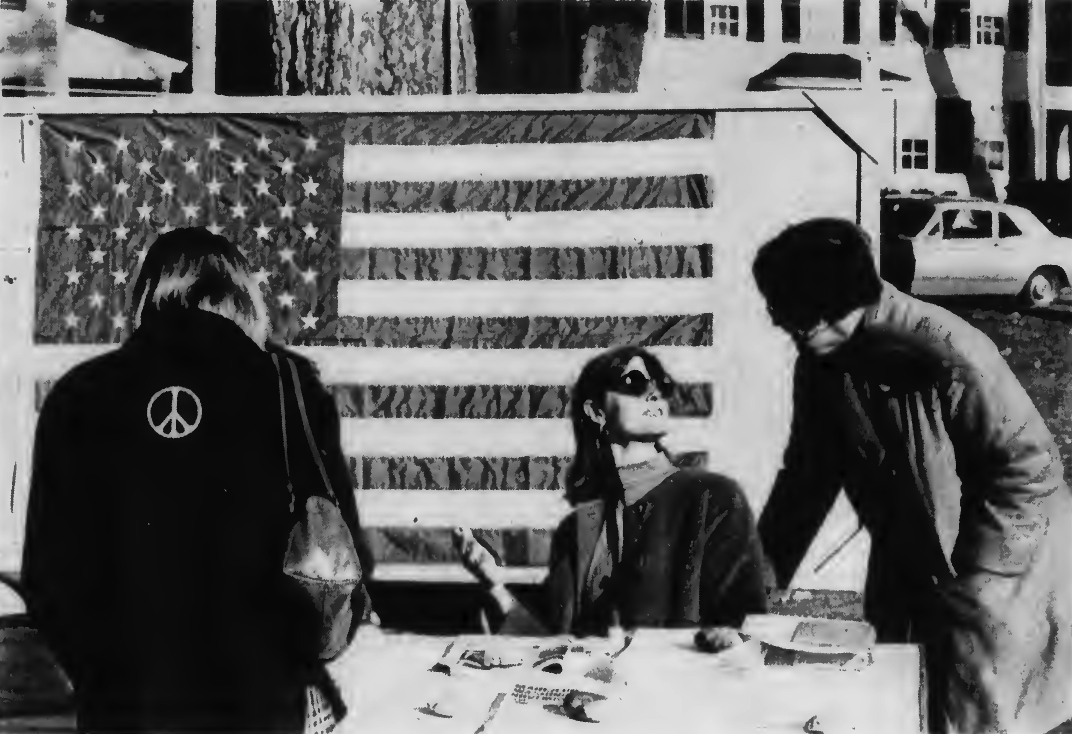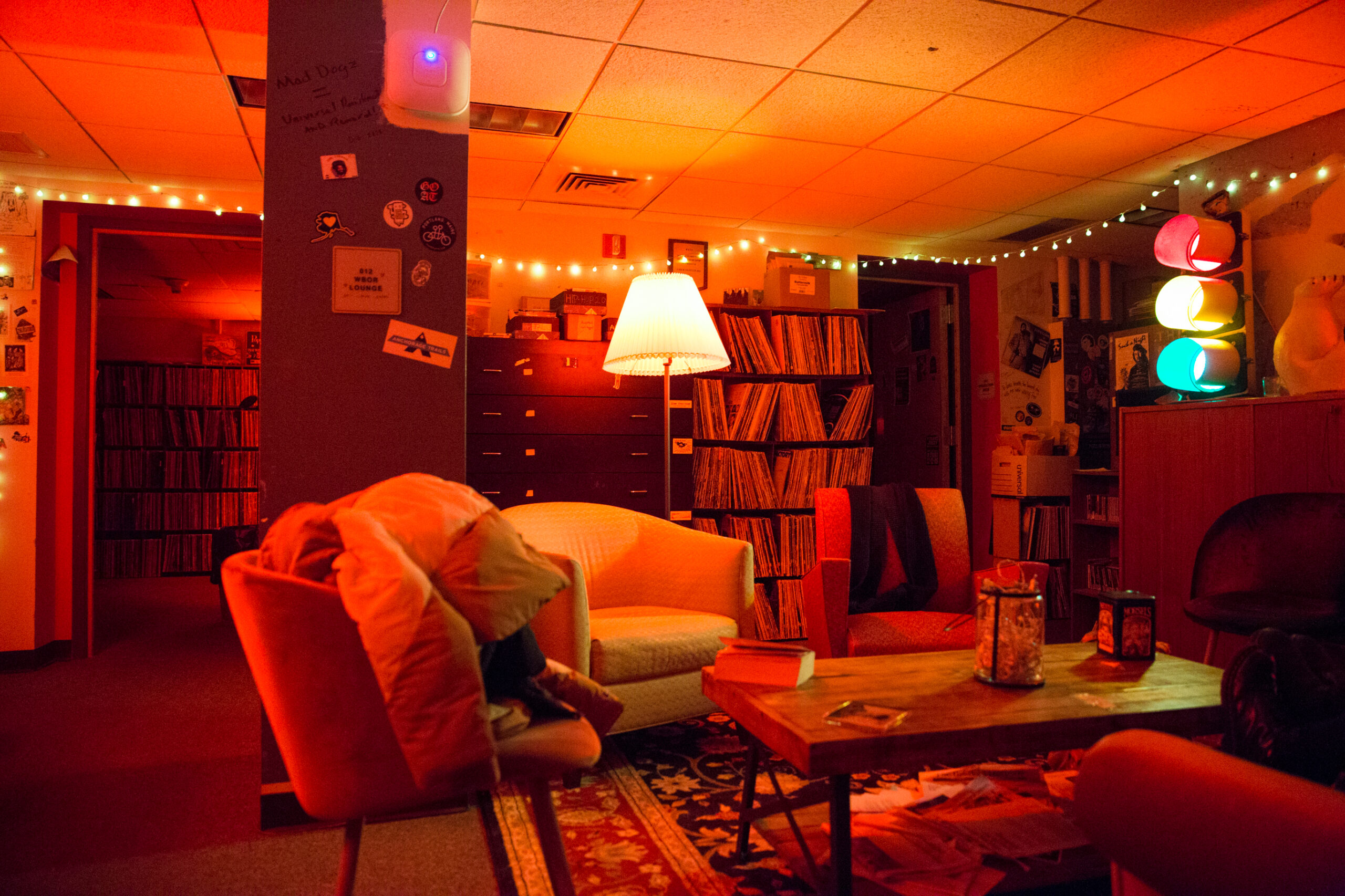In midwinter, leftism blooms at Bowdoin
February 15, 2019
On Tuesday evenings, the pink-lit walls of the basement that houses WBOR hold chatter that will never run on air: hypotheses on Marx, utopian visions of a socialist society and opinions on where Kamala Harris falls on the political spectrum. If you have OneCard access—or happen to catch word of the unofficial weekly meetings—you’d be privy to one of the few places on campus where leftism blooms.
Those gathered here have come for the “Reading Group,” a weekly meeting for both students with a background in leftist politics as well as those who are not yet political but desire a space to discuss their values in political terms.
What does it mean to be a leftist at Bowdoin? When it comes to defining the term, as a political and ethical orientation, the group keeps it open; sticking to definitions, the group’s leaders say, is not the point.
“We’ve struggled to identify exactly what [leftism] is because people have different definitions themselves,” said founding member Micah Wilson ’22. “We need a space where we can work through those ideas, because there is no answer that we can all agree on.”
“I’d say I’m very far left on the American political spectrum,” said fellow founding member Livia Kunins-Berkowitz ’22, when asked her own personal political beliefs. “My ideology is strongly rooted in racial economic justice and ideas of feminism. I would also say [I’m] currently fairly anti-capitalist as well.”
The participants of the group fluctuate from week to week—the group’s Facebook page currently has 40 members—but this past Tuesday, there were nine men and two women, chatting for over an hour.
The line between leftist thought and leftist action is a clear one for the group, which thinks of itself as decidedly not action-oriented. The Reading Group is a space to float new ideas, to wrestle with socialist thought and to develop an ethos—around what it means to recognize the current economic and political system as flawed and to articulate a vision for the future.
Kunins-Berkowitz noted that many students in the group have been politically active in some way over their time on campus—last fall, two members were arrested for protesting against Brett Kavanaugh’s nomination in Washington, while others spent time canvassing for local Maine candidates. Reading Group was founded to complement that activity.
“I think we need to fight for social change, and that goes beyond the classroom and goes beyond the books you’re reading,” Kunins-Berkowitz said. “But I also think that without theory and history and listening to each other’s perspectives, the social change is going to be less informed and less productive.”
Leftism has long found roots on college campuses. A few decades ago, Bowdoin students founded a local chapter of Students for a Democratic Society, tackling a range of social issues, from protesting the Vietnam War to calling on the College to improve labor conditions. But the group fizzled out after several years, and leftism has remained largely absent from Bowdoin’s mainstream discourse since.
 Orient Archives
Orient Archives“There’s certainly been a resurgence which is welcome from my perspective here,” said Professor of Economics Jonathan Goldstein, a self-professed socialist who is teaching a class called Marxian Political Economy. “I would say there’s a correlation of sorts with Bernie Sanders and the impact he had on this age demographic here at the College.”
Kunins-Berkowitz points out that the majority of the founding members and regular attendees of the group are first years and sophomores. She believes that the resurgence of socialism on campus this year can be attributed to national trends that have shaped her and her peers’ political consciousness.
“It’s tied to the legacies of the economic crisis, legacies of Occupy Wall Street, maybe even the legacies of international movements that kind of defined our growing up,” said Kunins-Berkowitz. “And then obviously, the Trump election really politicized people. I think we’re in the era of re-politicization and discontent with the Democratic Party in the way they’ve obviously failed working class people.”
Wilson says he has almost always been left-leaning, growing up in Cambridge and working on the Democratic Socialists of America (DSA) housing committee in high school. It was at the Mountain School of Milton Academy in Vermont where he met Kunins-Berkowitz, who grew up in Manhattan and also worked for the DSA in high-school. While spending time on a gap year together, the two began to talk about what leftism might look like at Bowdoin.
Upon arriving at Bowdoin, they met the group’s final founding member, Sarisha Kurup ’21, by way of an introduction by a history professor.
Kurup declined interview requests “in order to do what is most honest for the group.” Her comments are reflective of the group’s discomfort with publicity. With no school-sanctioned presence and an ambiguous-sounding name—the moniker “Reading Group” connotes neither political ideology nor specific purpose—the students operate within a certain assumption that those who lean so far left will naturally find one another.
“It’s just very word of mouth,” said Kunins-Berkowitz. Leaders maintain that anyone is welcome to participate, but Kunins-Berkowitz noted that the group is functional because “there’s an assumption of some amount of shared values.”
While chartered clubs send regular emails to members, the Reading Group coordinates logistics through a private Facebook group.
“There is this kind of romantic idea of this clandestine group that meets in a radio station with low lighting,” said Wilson. “But there is also something nice still about having a group that you can have a conversation with. I think if we broadcasted it a lot more, we would sacrifice the quality of the conversation.”
Member Diego Grossmann ’20 expressed frustration at the leaders’ reluctance to expand.
“I have no idea why we wouldn’t want to expand it. I don’t understand why that wouldn’t just be the goal of starting something like this,” he said. “To have it be some sort of platform for a broader conversation, becoming a part of political conversations on campus, expanding the political spectrum of that conversation. But it’s not really up to me.”
Another criticism of the group that all interviewees acknowledged—and one that is immediately apparent upon viewing its membership list or attending a meeting—is its demographics. The majority of the group is male, and most members are white.
“We’re self-aware that there is this ‘Bernie-bro’ association,” said Wilson.
Such as stereotype occurs well beyond the confines of Bowdoin, and it is a difficult pattern to break.
“Intellectual debate has always, in my experience, been a really male-dominated environment,” Kunins-Berkowitz said. “I think it’s how we teach young men to be assertive and to assert their political opinions frequently.”
She also acknowledges that most members of the group are wealthy—many attended elite high schools where they were exposed to leftist ideals early in their educations.
“I think that this has been an age old contradiction in Marxism, and leftism is, where does the revolution come from? The working class or the intellectual elites,” said Kunis-Berkowitz. “And no matter what economic class you come from, to be at Bowdoin, you’re now part of this specific society.”
Balancing the offer of a private, elite education and far-left, anti-capitalist ideals can be a fine line to toe. But it is a challenge group members seem to embrace, banking instead on the change that is possible when power is proximate.
“I don’t subscribe to the idea that you have to work outside of the system to change it,” said Wilson. “There are a lot of things that appeal to me about a liberal arts college that maybe is more elite … there is so much potential to seize that power that already exists and ideally cultivate more change, because we have that power.”


Comments
Before submitting a comment, please review our comment policy. Some key points from the policy: